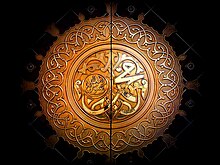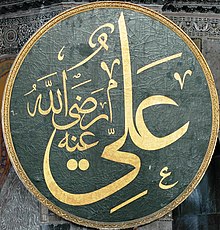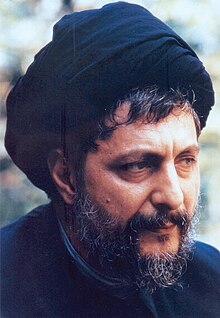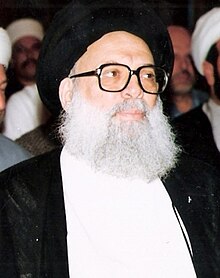Portal:Shia Islam
Shia Islam
Shia Islam (/ˈʃiːə/) is the second-largest branch of Islam. It holds that the Islamic prophet Muhammad designated Ali ibn Abi Talib (656–661 CE) as his successor (Arabic: خليفة, romanized: khalīfa) as Imam (امام, 'spiritual and political leader'), most notably at the event of Ghadir Khumm, but that after Muhammad's death, Ali was prevented from succeeding as leader of the Muslims as a result of the choice made by some of Muhammad's other companions (صحابة, ṣaḥāba) at Saqifah. This view primarily contrasts with that of Sunni Islam, whose adherents believe that Muhammad did not appoint a successor before his death and consider Abu Bakr, who was appointed caliph by a group of Muhammad's other companions at Saqifah, to be the first Rashidun ('rightful') caliph after Muhammad (632–634 CE).
Shia Muslims' belief that Ali was the designated successor to Muhammad as Islam's spiritual and political leader later developed into the concept of Imamah, the idea that certain descendants of Muhammad, the Ahl al-Bayt (أَهْل البَيْت, 'People of the House'), are rightful rulers or Imams through the bloodline of Ali and his two sons Hasan and Husayn, whom Shia Muslims believe possess special spiritual and political authority over the Muslim community. Later events such as Husayn's martyrdom in the Battle of Karbala (680 CE) further influenced the development of Shia Islam, contributing to the formation of a distinct religious sect with its own rituals and shared collective memory.
Shia Islam is followed by 10–15% of all Muslims. Although there are many Shia subsects in the Muslim world, Twelver Shi'ism is by far the largest and most influential, comprising about 85% of all Shia Muslims. Others include the Isma'ili, Zaydi, Alevi and Alawi. Shia Muslims form a majority of the population in four countries across the Muslim world: Iran, Iraq, Azerbaijan, and Bahrain. Significant Shia communities are also found in Lebanon, Kuwait, Turkey, Yemen, Saudi Arabia, Afghanistan and the Indian subcontinent. Iran stands as the world's only country where Shia Islam forms the foundation of both its laws and governance system. (Full article...)
Selected pictures
Chosen holy figures
Subcategories
Related portals
Selected articles
Selected biographies
Did you know...
- ... that the British wanted to destroy the Jama Masjid (pictured) after the Revolt of 1857?
- ... that Iran's Supreme Leader, Khamenei, is alleged to be the first senior Islamic cleric directly addressing western youth about his religion?
- ...that the Mourning of Muharram, observed by Shi'a Muslims, commemorates the anniversary of the death of Imam Husayn ibn Ali at the Battle of Karbala in 680?
Selected quote
Source
- Muhammad Kulayni, Usūl al-Kāfī, vol.2, p. 113
In the news
- 23 November 2024 – Insurgency in Khyber Pakhtunkhwa, Sectarian violence in Pakistan
- Clashes between Sunni and Shia fighters in Kurram District amid the aftermath of an attack on a Shiite civilian convoy kill 33 people and injure 25. (AP News)
- 22 November 2024 – Insurgency in Khyber Pakhtunkhwa, Sectarian violence in Pakistan
- Large crowds of protesters gather in Parachinar, Pakistan, to protest the massacre of 50 Shiite Pakistanis as well as the ongoing sectarian violence in the region. (Reuters) (MENAFN)
- 21 November 2024 – Insurgency in Khyber Pakhtunkhwa, Sectarian violence in Pakistan
- At least 42 people are killed and many others are wounded as gunmen open fire against two convoys carrying Shia people in Kurram District, Khyber Pakhtunkhwa, Pakistan. (Al Jazeera)
- 22 October 2024 – Islamic State insurgency in Iraq
- Prime Minister of Iraq Mohammed Shia' Al Sudani announces the death of several Islamic State senior members, including the group's leader in Iraq, in a military operation in Saladin Governorate, Iraq. (The Washington Post)
- 25 September 2024 – Sectarian violence in Pakistan, Shia–Sunni relations
- At least 25 people are killed and dozens are injured in clashes between Shia and Sunni Muslim tribes in Kurram District, Khyber Pakhtunkhwa, Pakistan, since September 20. (AP)
- 12 September 2024 – Afghan conflict
- Fourteen people are killed and six more are injured during a mass shooting by Islamic State militants against a bus carrying Shia Hazara people between the Afghan provinces of Ghor and Daikundi, after returning from a pilgrimage in Iraq. (AP)
On this day: 21 Jumada al-awwal
Nothing yet for this day
Wikimedia
The following Wikimedia Foundation sister projects provide more on this subject:
-
Commons
Free media repository -
Wikibooks
Free textbooks and manuals -
Wikidata
Free knowledge base -
Wikinews
Free-content news -
Wikiquote
Collection of quotations -
Wikisource
Free-content library -
Wikiversity
Free learning tools -
Wikivoyage
Free travel guide -
Wiktionary
Dictionary and thesaurus











![Image 1 Muhammad (/moʊˈhɑːməd/; Arabic: مُحَمَّد, romanized: Muḥammad, lit. 'praiseworthy'; [mʊˈħæm.mæd]; c. 570 – 8 June 632 CE) was an Arab religious, social, and political leader and the founder of Islam. According to Islam, he was a prophet who was divinely inspired to preach and confirm the monotheistic teachings of Adam, Noah, Abraham, Moses, Jesus, and other prophets. He is believed to be the Seal of the Prophets and last Ulu al-ʿAzm Prophet in Islam along with the Quran, his teachings and normative examples form the basis for Islamic religious belief. Muhammad was born c. 570 CE in Mecca. He was the son of Abdullah ibn Abd al-Muttalib and Amina bint Wahb. His father, Abdullah, the son of Quraysh tribal leader Abd al-Muttalib ibn Hashim, died around the time Muhammad was born. His mother Amina died when he was six, leaving Muhammad an orphan. He was raised under the care of his grandfather, Abd al-Muttalib, and paternal uncle, Abu Talib. In later years, he would periodically seclude himself in a mountain cave named Hira for several nights of prayer. When he was 40, c. 610, Muhammad reported being visited by Gabriel in the cave and receiving his first revelation from God. In 613, Muhammad started preaching these revelations publicly, proclaiming that 'God is One', that complete 'submission' (Islām) to God (Allāh) is the right way of life (dīn), and that he was a prophet and messenger of God, similar to the other prophets in Islam. (Full article...)](http://upload.wikimedia.org/wikipedia/en/d/d2/Blank.png)

































